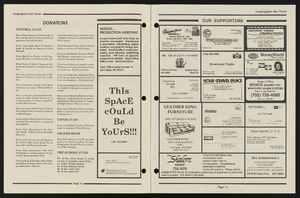Search the Special Collections and Archives Portal
Search Results

Nick Robone oral history interview: transcript
Date
Archival Collection
Description
Oral history interview with Nick Robone conducted by Claytee D. White and Barbara Tabach on December 21, 2017 for the Remembering 1 October Oral History Project. In this interview, Nick Robone, born and raised in Nevada, details his process of healing after being shot during the 2017 Las Vegas mass shooting at the Route 91 Harvest music festival. He discusses the events of that Sunday night and how he has learned to view life in a more positive light. Robone mentions various coping mechanisms that have helped him, including being open about his experience and talking about it with other survivors as well as pursuing his passions.
Text
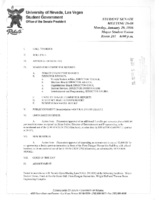
Meeting minutes for Consolidated Student Senate University of Nevada, Las Vegas, January 29, 1996
Date
Archival Collection
Description
Text
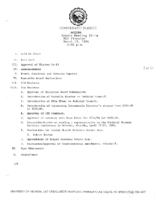
Meeting minutes for Consolidated Student Senate University of Nevada, Las Vegas, March 13, 1986
Date
Archival Collection
Description
Text
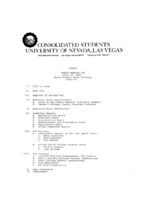
Meeting minutes for Consolidated Student Senate, University of Nevada, Las Vegas, April 29, 1980
Date
Archival Collection
Description
Text

Meeting minutes for Consolidated Student Senate, University of Nevada, Las Vegas, June 01, 1982
Date
Archival Collection
Description
Text
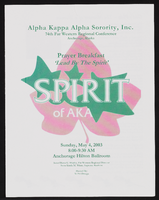
Alpha Kappa Alpha Sorority, Theta Theta Omega Chapter 74th Far Western Regional conference program and reports
Date
Archival Collection
Description
From the Alpha Kappa Alpha Sorority, Incorporated, Theta Theta Omega Chapter Records (MS-01014) -- Chapter records file.
Text
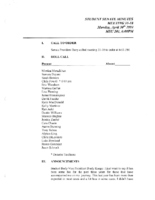
Meeting minutes for Consolidated Student Senate, University of Nevada, Las Vegas, April 30, 2001
Date
Archival Collection
Description
Text

Alan Stock oral history interview: transcript
Date
Archival Collection
Description
Oral history interview with Alan Stock conducted by Barbara Tabach on December 27, 2017 for the Remembering 1 October Oral History Project. In this interview, Alan Stock discusses moving to Las Vegas, Nevada in 1999 for his job as a radio talk show host for KXNT. Stock describes the broadcast that covered the October 1, 2017 Las Vegas mass shooting from 11 PM on that night until 9 AM the next morning. He talks about some of the calls the station received from various members of the community, including survivors of the shooting, families of those at the event, people on lockdown in the nearby hotels, doctors, and general listeners. Stock describes some of the topics discussed on the broadcast, such as what was currently happening on the Las Vegas Strip, stories of the aftermath, and the support needed from the general public. Other topics include gun control and conspiracy theories. He discusses the impact this and other shootings would have on public affairs, including tighter security in daily living and public gatherings. He compares security in the United States to security in Israel and other countries, focusing on the idea of unconcealed guns worn in public. Throughout this interview, Alan Stock explains that the radio station's goal was to provide accurate information to the public during the aftermath of the October 1, 2017 mass shooting.
Text

